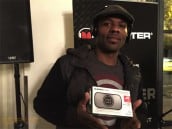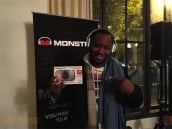Find Our Latest Video Reviews on YouTube!
If you want to stay on top of all of our video reviews of the latest tech, be sure to check out and subscribe to the Gear Live YouTube channel, hosted by Andru Edwards! It’s free!
Latest Gear Live Videos
More Wii Rumors: Wii Camera Under the “Secret Slot”?
Posted by Michael Cardiff Categories: Hardware, Nintendo, Rumors, Wii,
 NintendoGossip is reporting on an image found in some promotional E3 materials that shows the Wii with its “Secret Slot” open (i.e., the flap beneath the blue-lit drive). The image looks a bit iffy - the plastic shown under the secret slot doesn’t appear to match very well with the rest of the console, which is very odd for a company that has placed so much emphasis on design recently. Still, it’s interesting to speculate on what can be seen - there’s a fairly obvious port for memory cards, but also a round port or lens located towards the top of the secret slot. NintendoGossip and Kotaku are suggesting that perhaps this could be the rumored Wii-camera that allows you to “put your face in the game” as Miyamoto suggested.
NintendoGossip is reporting on an image found in some promotional E3 materials that shows the Wii with its “Secret Slot” open (i.e., the flap beneath the blue-lit drive). The image looks a bit iffy - the plastic shown under the secret slot doesn’t appear to match very well with the rest of the console, which is very odd for a company that has placed so much emphasis on design recently. Still, it’s interesting to speculate on what can be seen - there’s a fairly obvious port for memory cards, but also a round port or lens located towards the top of the secret slot. NintendoGossip and Kotaku are suggesting that perhaps this could be the rumored Wii-camera that allows you to “put your face in the game” as Miyamoto suggested.
We’ll file this one firmly in the “rumors that probably won’t come true but would be nice if they did” bin for now. Hopefully after their competitors announce their final specs Nintendo can finally give away the last of the secrets they’ve been keeping on the Wii.
Read More  | NintendoGossip.com via Kotaku.com
| NintendoGossip.com via Kotaku.com
Gallery: More Wii Rumors: Wii Camera Under the “Secret Slot”?
Advertisement
The new HDMI 1.3 specification was recently announced, and the largest change, according to Extremetech, is a bandwidth increase from 165 MHz to over 225 MHz. The net effect of this change means that displays will be able to support 1080p displays at up to 90hz, or a 1080p 60hz display supporting 36-bit color or “deep color.” Leslie Chard, President of Licensing for HDMI, explains the limitations of 24-bit color: “that gets you 16 million colors, and the human eye can distinguish… That leads to scaling and onscreen effects which you can pick up. Either 36-bit or 48-bit RGB is beyond the ability of the human eye to distinguish.” The Blu-Ray and HD-DVD specifications technically allow for deep color support, but neither has officially announced availability. Gamers will note, however, that the PS3 will supposedly support the deep color specification, adding one more reason why the HDMI-capable PS3 should be favored. Of course, current digital televisions don’t support the deep color specification, as most are based around HDMI 1.1 or 1.2. The consumer electronics industry should be selling televisions with support for the new specification by this holiday season, adding one more expensive item the hard-core will need to experience the PS3 to the fullest.
Read More  | ExtremeTech
| ExtremeTech
Gallery: PS3 To Support “Deep Color”
Yahoo Takes On PS3 vs Xbox 360
Posted by Christopher Sasaki Categories: Hardware, PlayStation 3, Xbox 360,
 Yahoo Games has published a “state of the battle” between the Xbox 360 and the Playstation 3. Overall, the article is a decent summary of the strengths and weaknesses of the two platforms, covering: system hardware, exclusive games, high definition gaming, and movie formats.
Yahoo Games has published a “state of the battle” between the Xbox 360 and the Playstation 3. Overall, the article is a decent summary of the strengths and weaknesses of the two platforms, covering: system hardware, exclusive games, high definition gaming, and movie formats.
The hardware rundown is mostly accurate, but there are a couple of statements that stand out. Stating this: “Unlike the two Xbox 360 versions, it’s impossible to later upgrade the basic version of the PlayStation 3. If you want to snag the advanced features, you must pick up the more expensive system at the outset” is not exactly accurate. Of all the differences between the two SKUs, the only functionality that can’t be achieved by the lower cost unit is the HDMI port. This may come into play later, but all the other functionality can be had, according to Sony. The hard drive is a user upgradeable SKU, with off the shelf hardware. Those users wanting wireless networking will be able to get a USB wireless dongle, and similarly, memory stick functionality can be achieved through the USB ports as well.
Click to continue reading Yahoo Takes On PS3 vs Xbox 360
Gallery: Yahoo Takes On PS3 vs Xbox 360
Video Game Software Sales Down 10% in May
Posted by Josh Smith Categories: Corporate News, Hardware, Nintendo, Nintendo DS, Xbox, Xbox 360, Xbox Live Marketplace,
 After promising sales in April the video game industry was brought back to reality in May. Console software sales are 10% lower than May 2005. The drop has alarmed many analysts even though overall sales, hardware and software combined, show a rise from last May. One major reason for the decreased sales is that the video game industry is in a transition to next generation consoles. This transition has gamers waiting to purchase next-gen titles, couple this with only 2 new Xbox 360 games in May and lackluster sales are more easily explained.
After promising sales in April the video game industry was brought back to reality in May. Console software sales are 10% lower than May 2005. The drop has alarmed many analysts even though overall sales, hardware and software combined, show a rise from last May. One major reason for the decreased sales is that the video game industry is in a transition to next generation consoles. This transition has gamers waiting to purchase next-gen titles, couple this with only 2 new Xbox 360 games in May and lackluster sales are more easily explained.
Michael Pachter, an analyst from Wedbush Morgan Securities, summed up the situation, saying “We think that this trend foreshadows continuing weak sales until the holidays, as we expect continued monthly year-over-year declines of 30 - 40% for current generation software sales, with next generation software sales growth failing to offset these declines. We do not expect next generation software sales to offset the decline in current generation software sales until the fall, when a strong lineup of Xbox 360 games is anticipated and launches of the PS3 and Wii are scheduled.”
My own predictions call for decreased Xbox 360 software sales over the next months with increased Nintendo DS hardware and software sales due to the release of the Nintendo DS Lite. I am curious if Xbox Live Marketplace content is counted into the overall software sales for the Xbox 360 since there are currently more releases on the Marketplace than in retail stores.
Read More  | Game Daily
| Game Daily
Gallery: Video Game Software Sales Down 10% in May
Man Steals 60 PSP Games From Blockbuster
Posted by Josh Smith Categories: Culture, Hardware, Portable/Mobile, PSP,
 Last night a Myrtle Beach man stole 60 games from a local Blockbuster in one trip. Store employees spotted the individual stuffing PSP games into his pants around 8:30 PM. The games are valued at $1,800 or roughly $30 bucks each. The theft came as a shock to members of the gaming community, many of whom currently believe the PSP has very few titles worth stealing. Blockbuster has also issued a warning to stores in the area to be on the lookout for any customer who wears baggy pants and waddles as they exit the store. Someone please send us the security cam footage of this one!
Last night a Myrtle Beach man stole 60 games from a local Blockbuster in one trip. Store employees spotted the individual stuffing PSP games into his pants around 8:30 PM. The games are valued at $1,800 or roughly $30 bucks each. The theft came as a shock to members of the gaming community, many of whom currently believe the PSP has very few titles worth stealing. Blockbuster has also issued a warning to stores in the area to be on the lookout for any customer who wears baggy pants and waddles as they exit the store. Someone please send us the security cam footage of this one!
Read More  | The Sun News
| The Sun News
Gallery: Man Steals 60 PSP Games From Blockbuster
Most Mac Gamers Still Play on Their Macs (For Now)
Posted by Michael Cardiff Categories: Hardware, Mods/Hacks, PC,
 Soon after Boot Camp was released (the software that allowed Intel-based Macs to run Windows) there was quite a bit of speculation about what this would mean for companies that specialize in porting games to the OS X platform. If serious gamers could simply boot their Macs to Windows XP to play games, wouldn’t this make porting games to the Mac obsolete? Well, for now at least the answer appears to be a solid “No.”
Soon after Boot Camp was released (the software that allowed Intel-based Macs to run Windows) there was quite a bit of speculation about what this would mean for companies that specialize in porting games to the OS X platform. If serious gamers could simply boot their Macs to Windows XP to play games, wouldn’t this make porting games to the Mac obsolete? Well, for now at least the answer appears to be a solid “No.”
Macworld reports the results of a recent survey showing that more Mac users game on their Apple computers than use a PC or Boot Camp. Roughly 800 (out of 2,400 respondents) stated that they use their Mac as their primary gaming platform, with around 300 users reporting that the primarily play on a PC or a Mac running Boot Camp. Of course, these figures could be highly skewed by the fact that the majority of Mac users may still not have Intel-based Macs, which are a requirement for running Boot Camp and were only released early this year.
Read More  | Macworld
| Macworld
Gallery: Most Mac Gamers Still Play on Their Macs (For Now)
PS3: Challenging, But Not “Broken”
Posted by Christopher Sasaki Categories: Hardware, PlayStation 3, Rumors,
Top game developers working on the PS3 have dismissed the recent claims from web news site, The Inquirer, as “entirely meaningless” and “misleading and uninformed” according to a report on GamesIndustry.biz. The claims of poor triangle performance by the Inquirer, while they may be technically true, are difficult to compare without knowing the types of tests that were run and the environment that they were run against. In the PC world, raw triangle count can only give the barest idea of performance, and according to the developers that GamesIndustry.biz talked to, “the PlayStation 2 had better tri performance than the Xbox, on paper” but “everyone knows that the Xbox was more powerful at running real games.”
Tackling the issue of the 16Mb/sec “local memory” figure, again, the developers claimed that the specification was true, but without the true context of what was being talked about. According to the report, every “developer concurred that the slide in question was referring to local memory on the RSX,” meaning that the memory access path from the Cell processor to the local RSX memory is slow. One developer stated, “it’s a total non-issue. You never, ever need to access that memory from the Cell…” Mostly, developers have found that the PS3 “was a challenge to work on… but every new platform takes a while to get used to…early PS2 games…were a real nightmare.”
Unfortunately, the developers quoted did not want to be named, for fear of NDA violations, but the quotes certainly seem to make more sense than the claims that The Inquirer was making. Certainly, there haven’t been developers lining up to bash the Playstation 3, most have been public about the performance of the hardware have been on the positive side of things; probably the most damning statement from any developer has been that the PS3 and the Xbox 360 were roughly the same in performance.
Read More  | GamesIndustry.biz
| GamesIndustry.biz
Gallery: PS3: Challenging, But Not “Broken”
Gamers playing games like Perfect Dark Zero and Ghost Recon: Advanced Warfighter may have noticed that there are occasions when the screen appears to tear while playing. Team.com talked to Chris Satchell of the Games Development Group at Microsoft to try and pin down why this is happening. Many gamers have speculated that the issue is related to the fact that in order to get better frame rate performance from games, some developers disable the vertical sync on the console, or v-sync. Satchell responds: “Users are correct; ‘Page tearing’ is an artifact of changing the displayed frame of the game while the display device is partially through displaying the previous frame.”
PC Gaming enthusiasts have seen this in their games for a while, but the difference on the PC is that the user is usually given control over the v-sync setting, and can either disable it for performance, or enable it for picture fidelity. Gamers on the Xbox 360 haven’t been given that choice; for games like PDZ and GRAW, v-sync is always off.
Unfortunately, Microsoft doesn’t really offer a good solution for Xbox 360 owners. Satchell’s brilliant suggestion: “There isn’t anything I would recommend for consumers that can help alleviate the problem. I think when gamers get their hands on this years 2nd generation Xbox 360 titles they will be blown away with the visual excellence. So my only advice would be; make sure you have an Xbox 360 this holiday.” Microsoft appears to be using the distraction defense for this issue, where in an ideal world, gamers would be given the option to enable and disable v-sync on their own, so those gamers who value picture fidelity can get the imagery that they deserve from a next generation platform like the Xbox 360.
Read More  | TeamXbox.com
| TeamXbox.com
Gallery: V-Sync Issues On Xbox 360
 The guys over at 4 Color Rebellion have just published a great DS buyer’s guide, for those people tempted into jumping onto DS Lite bandwagon. They feature some of their favorite games and accessories, as well as give a short rundown on how to transfer your old WiFi connection settings to your new Nintendo DS Lite. There might not be a whole lot new for existing DS owners, but for people on the fence, this colorful, funny, guide may push them over the edge. 4 Color Rebellion made it available as a PDF and as Flash; if you need to convince someone (significant other, parents, relatives, co-workers) why the DS Lite is a necessary part of everyone’s day, print out a guide or send them a link.
The guys over at 4 Color Rebellion have just published a great DS buyer’s guide, for those people tempted into jumping onto DS Lite bandwagon. They feature some of their favorite games and accessories, as well as give a short rundown on how to transfer your old WiFi connection settings to your new Nintendo DS Lite. There might not be a whole lot new for existing DS owners, but for people on the fence, this colorful, funny, guide may push them over the edge. 4 Color Rebellion made it available as a PDF and as Flash; if you need to convince someone (significant other, parents, relatives, co-workers) why the DS Lite is a necessary part of everyone’s day, print out a guide or send them a link.
Read More  | 4 Color Rebellion
| 4 Color Rebellion
Gallery: DS Lite Buyer’s Guide

At the Computex show in Taiwan, ATI announced their physics acceleration solution based around their Crossfire technology. Rather than utilize existing shaders (as nVidia will implement for their Havok solution) and instead of implementing a PCI card (like Ageia does with their PhysX solution,) ATI will allow gamers to add either a second or third ATI X1000 series card to their system and dedicate one video card to physics rendering through asymmetric processing. Gamers who already have two video cards implemented in a Crossfire rendering configuration could add another X1000 series card to their system to dedicate to physics rendering.
One interesting thing is that gamers who are looking to upgrade their Crossfire capable systems, but only have one video card, can add a second card, and use the more powerful for graphics rendering, while the older card could be used for physics rendering.
This gives a cost advantage over the Ageia solution, since the PhysX card is dedicated to physics processing and is a fixed price, but given the speed at which GPUs drop in price, the ATI cards will become more economical, faster. The only thing left out of ATI’s announcement are benchmarks, but given the state of gaming and existing support for physics processing, it isn’t surprising that there wasn’t a specific game demo shown.
Read More  | HardOCP
| HardOCP
















